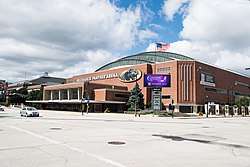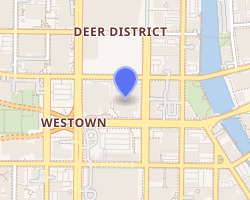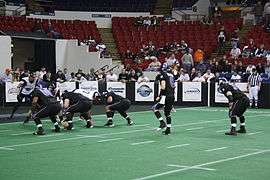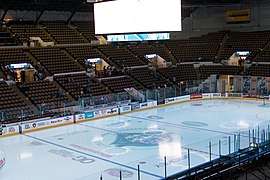UW–Milwaukee Panther Arena
The UW–Milwaukee Panther Arena (originally the Milwaukee Arena and formerly MECCA Arena and U.S. Cellular Arena) is an indoor arena located in Milwaukee, Wisconsin. The arena, which seats as many as 12,700 people and offers 41,700 square feet (3,874 m2) of floor space, is part of a larger downtown campus, that includes the Milwaukee Theatre and Wisconsin Center.
 | |
 Exterior of venue in 2018. | |

| |
| Former names | Milwaukee Arena (1950–1974) MECCA Arena (1974–1995) Wisconsin Center Arena (1995–2000) U.S. Cellular Arena (2000–2014) |
|---|---|
| Address | 400 W Kilbourn Ave |
| Location | Milwaukee, Wisconsin |
| Coordinates | 43°2′32″N 87°55′1″W |
| Owner | Wisconsin Center District |
| Capacity | 12,700 (maximum) 10,783 (basketball) 9,500 (indoor soccer) 9,652 (ice hockey) 8,910 (permanent seats) |
| Scoreboard | American Sign & Indicator (now Trans-Lux) (1968-1998) |
| Construction | |
| Broke ground | November 3, 1948[1] |
| Opened | April 9, 1950[2] |
| Renovated | 1998, 2016 |
| Construction cost | US$7.6 million ($80.9 million in 2019 dollars[3]) |
| Architect | Eschweiler & Eschweiler |
| General contractor | Hunzinger Construction Co.[4] |
| Tenants | |
| Milwaukee Hawks (NBA) (1951–1955) Milwaukee Bucks (NBA) (1968–1988) Marquette Warriors (NCAA) (1974–1988) Milwaukee Admirals (IHL/AHL) (1977–1988, 2016–present) Milwaukee Does (WBL) (1978–1980) Milwaukee Panthers (NCAA) (1992–1998, 2003–2012, 2013–present) Milwaukee Wave (MASL) (2003–present) Brewcity Bruisers (WFTDA) (2005–present) Milwaukee Bonecrushers (CIFL) (2008–2009) Green Bay Chill (LFL) (2014) | |
| Website | |
| http://uwmilwaukeepantherarena.com/ | |
The arena was part of the MECCA Complex from 1974 until the 1995 opening of the Midwest Express Center.
History
The arena opened in 1950 and was one of the first to accommodate the needs of broadcast television. It was folded into MECCA (The Milwaukee Exposition, Convention Center and Arena) when the complex opened in 1974. It is also known for its former, uniquely painted basketball court by Robert Indiana in 1978, with large orange 'M's taking up both half-courts representing Milwaukee.[5] The Indiana floor was purchased by a fan in the early 2010s and is currently in storage at an unnamed location in the Milwaukee area.[6]
It was home to the Milwaukee Hawks (1951–55) and the Milwaukee Bucks of the NBA (1968–1988), and hosted the 1977 NBA All-Star Game before an audience of 10,938. The venue was also home to Marquette University's men's basketball team along with the International Hockey League's Milwaukee Admirals. These teams all moved to the BMO Harris Bradley Center upon the arena's opening in 1988.
On October 26, 2017, the Bucks returned to the arena for a regular season game against the Boston Celtics in honor of their 50th anniversary in the NBA. For this event, the Bucks, by agreement with Indiana, installed a newly built floor featuring a duplicate of his original MECCA court for that game only. After the game, the floor was sanded down to remove the replica of Indiana's original work and moved to Menominee Nation Arena in Oshkosh, home to the Bucks' NBA G League affiliate, the Wisconsin Herd (although the team does not play on the floor used in the commemorative game).[6]
In 1994, the Wisconsin Center District (WCD), a state organization, was created in order to fund the Midwest Express Center, and, in 1995 the MECCA complex was folded into this, including the Arena (the soon-to-be-extinct BMO Harris Bradley Center and the newly opened Fiserv Forum are owned by a separate authority). Following a major overhaul in 1998, the arena is now home to the Milwaukee Wave of the Major Indoor Soccer League (including the 2006 MISL All-Star game) and is the Milwaukee venue for Disney on Ice.
The WCD added the Wisconsin Athletic Walk of Fame alongside the U.S. Cellular Arena in 2001. At the end of this public promenade is a Wisconsin Historical Marker noting the location where Christopher Sholes invented the first practical typewriter, featuring the QWERTY keyboard layout.
As the MECCA, the building hosted first- and second-round games in the Mideast Regional of the 1984 NCAA tournament. The U.S. Cellular Arena also hosted all or part of every Horizon League men's basketball conference tournament from 2003 to 2011.
In 2008 and 2009, it was home to the Milwaukee Bonecrushers of the Continental Indoor Football League.[7]
On August 7, 2010, the arena hosted an Arena Football League playoff game between the Milwaukee Mustangs and the Chicago Rush. The Iron played its 2010 regular season home games at the BMO Harris Bradley Center, but the ongoing installation of the new center court scoreboard in that venue forced the home playoff games to be played at the U.S. Cellular Arena, where the Milwaukee Mustangs would go on to win.
It is also home to the Brewcity Bruisers roller derby league.
Milwaukee Panthers connection and renaming
The arena has been the home of the Milwaukee Panthers men's basketball team at three different times—first from 1993 to 1998, then from 2003 to 2012, and since 2013. The Panthers played their 2012–2013 home games at the 3,500-seat Klotsche Center on UWM's east side campus. The move generated complaints from some Panthers fans and attendance lagged as the team limped to its worst record since the 1990s. After Amanda Braun was named UWM's athletic director in March 2013, she said she would re-examine the decision to move games from the U.S. Cellular Arena. In July 2013, UWM officials reached a 5-year contract with the arena owner, Wisconsin Center District, that runs through the 2017–2018 season.[8]
U.S. Cellular's naming rights expired on May 31, 2014, and they did not renew their contract.[9] On June 26, 2014, it was announced that the Arena would be renamed the UW–Milwaukee Panther Arena, as part of an agreement which would run at least through 2024, with UWM having an option to extend it through 2029.[10] The deal additionally makes the arena officially the major site for UWM events such as graduation ceremonies, a role it had already taken for years before.

In August 2015, it was revealed that the Milwaukee Admirals were considering a return to UWM Panther Arena in the next few seasons. Their then-current home, BMO Harris Bradley Center, was eventually replaced by the new Fiserv Forum, and the Admirals had not expressed any interest of moving into the arena, and in fact, said they were actually against moving into it. Logically, the move could make sense for a few reasons: more open scheduling dates, the chance to actually share in arena operations rather than just being a tenant, and more marketing in the arena, which they are hardly able to do in Bradley Center. Moreover, Panther Arena's operators have said they would welcome the Admirals moving into the arena.
On March 16, 2016, it was announced the Admirals signed a 10-year lease with a five-year mutual extension. Also included on the deal was $6.3 million for upgrades to the arena.[11]

On June 10, 2017, the Milwaukee Bucks announced, as part of celebrating the Bucks' 50th season in the NBA, the team would play one regular season game during the 2017–18 season at the Arena.[12] The game was against the Boston Celtics and took place on October 26, 2017. The Celtics beat the Bucks 96–89.
Other uses
Concerts
Since the 1960s, the Arena has held a number of concerts by high-profile performers. The Beatles headlined a performance in the Arena as part of their historic 1964 U.S. tour.
Elvis Presley performed 2 back-to-back shows at the Arena on June 14 and 15, 1972. He would return again on June 28, 1974 and again on April 27, 1977, with the latter occurring 4 months before his death on August 16 of that year.
Folk-rock icon Bob Dylan also played a two-night stand there in mid-October as part of his Fall 1981 tour.
Professional wrestling
The arena has also hosted professional wrestling events, including WCW's SuperBrawl (1992), Clash of the Champions XXXIV (1997)[20] and Mayhem (2000). It also hosted the World Wrestling Federation's King of the Ring (1996), and Over the Edge (1998). It was at the aforementioned King of the Ring card where Stone Cold Steve Austin first uttered his now-famous "Austin 3:16" catchphrase. It was scheduled to host the April 1, 2020 edition of All Elite Wrestling Dynamite before coronavirus-related public assembly concerns postponed the circuit's Milwaukee show to October 28.[21]
See also
- MECCA Great Hall – a convention center and part of the MECCA complex
- List of NCAA Division I basketball arenas
References
- Jones, Robert F. (April 10, 1960). "Arena Opening in 1950 Like Dream Come True". The Milwaukee Sentinel. p. 9. Retrieved March 5, 2013.
- On This Day in Wisconsin History
- Federal Reserve Bank of Minneapolis. "Consumer Price Index (estimate) 1800–". Retrieved January 1, 2020.
- "Arena Bonds Draw Only One Bid; Offer Rejected". Milwaukee Journal. December 16, 1948. Retrieved March 28, 2012.
- https://cdn.vox-cdn.com/thumbor/eruHv5zCjzqhhvgINffKM7Q25NE=/0x0:455x357/920x613/filters:focal(208x165:280x237):format(webp)/cdn.vox-cdn.com/uploads/chorus_image/image/57338021/Screen_Shot_2017_10_26_at_2.59.12_PM.0.png
- Nelson, James B. (October 20, 2017). "Milwaukee Bucks re-create Robert Indiana's colorful MECCA floor for one game". Milwaukee Journal Sentinel. Retrieved November 4, 2017.
- Walker, Don (July 17, 2007). "Arena Football is Back in Milwaukee". Milwaukee Journal Sentinel. Archived from the original on September 29, 2007. Retrieved July 17, 2007.
- Kirchen, Rich (July 15, 2015). "UWM men's basketball returning to U.S. Cellular Arena". The Business Journal. Retrieved July 15, 2013.
- Michele, Michele. "Name change in the works for US Cellular Arena". Archived from the original on 2014-10-23. Retrieved 2014-05-27.
- Walker, Don. "Former U.S. Cellular Arena to be named for UWM Panthers" Milwaukee Journal Sentinel June 26, 2014
- Kirchen, Rich (March 6, 2016). "Admirals sign 10-year lease at Panther Arena; $6.3 million in upgrades in works". bizjournals.com. Milwaukee Business Journal. Retrieved May 14, 2019.
- ""Return to the MECCA:" Milwaukee Bucks to play game at Panther Arena for 50th Anniversary". Fox 6 News. Retrieved 12 June 2017.
- Breslin, Jimmy (February 19, 1959). "Hawks Too Big In St. Louis So Hickey Lifts Marquette". Star-Banner. Ocala, Florida. p. 9. Retrieved March 5, 2013.
- Bledsoe, Terry (December 26, 1962). "Luncheon, Clinic Are Extras For Classic Tournament Fans". The Milwaukee Journal. Retrieved March 5, 2013.
- Kupper, Mike (February 26, 1970). "MU to Set Record, Despite New Math". The Milwaukee Journal. Retrieved March 5, 2013.
- "Seating At Arena Increased To 10,938". The Milwaukee Journal. August 23, 1973. Retrieved March 5, 2013.
- "Arena Will Get 114 More Seats". The Milwaukee Sentinel. September 25, 1980. Retrieved March 5, 2013.
- Dabe, Christopher (January 3, 2004). "Eagles Anxious to Put Down Roots". Milwaukee Journal Sentinel. Retrieved March 5, 2013.
- "Facilities: Panther Arena". UW-Milwaukee Athletics. Retrieved October 27, 2017.
- "Clash of Champions Results (XXXIV)". Archived from the original on 2010-11-28.
- Kasabian, Paul (13 March 2020). "AEW Relocating April's St. Louis, Milwaukee Shows Because of Coronavirus". Bleacher Report. Retrieved 22 March 2020.
External links
| Events and tenants | ||
|---|---|---|
| Preceded by Wharton Field House |
Home of the Milwaukee Hawks 1951–1955 |
Succeeded by Kiel Auditorium |
| Preceded by first arena |
Home of the Milwaukee Bucks 1968–1988 |
Succeeded by BMO Harris Bradley Center |
| Preceded by The Spectrum |
Host of the NBA All-Star Game 1977 |
Succeeded by Omni Coliseum |